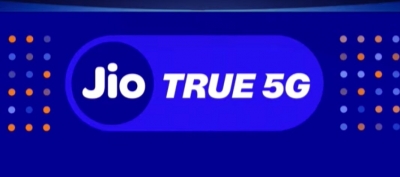Business
Prudent financial management helps Reliance Jio reduce running costs

Reliance Jio Infocomm Limited prepaid entire deferred liabilities pertaining to spectrum acquired in auctions of year 2014, 2015, 2016 and the spectrum acquired in year 2021 through trading of right to use with Bharti Airtel Limited aggregating to Rs 30,791 crore (including accrued interest) in FY2021-22.
This was refinanced through a mix of INR Loans and Debentures. The Company expects that this prepayment will result in interest savings of about Rs 1,200 crore annually.
Reliance, a responsible organisation, leveraged its intellectual capital to contribute to the country’s fight against Covid-19.
Reliance’s scientists analysed more than 1,000 genomes of the virus.
The knowledge base was used to develop novel cost-effective diagnostic kits called ‘R-Green’ and ‘R-Green pro one’. These kits have received ICMR approval and showed a high degree of accuracy and specificity during validation studies.
Reliance has also collaborated with IIIM-CSIR (Jammu) to develop an RT-LAMP Kit to facilitate the point-of-care diagnosis of Covid-19.
The R&D team actively contributes to the company’s technical wisdom to facilitate innovation globally by publishing research articles on diagnostics and treatment. Application of natural-astaxanthin for COVID-19 management published in ‘Biomedicine and Pharmacotherapy’ journal is recognised as top 100 research paper. The paper is listed in WHO’s global repository.
PSA based oxygen concentrators can produce oxygen with 93 per cent (+- 3 per cent) purity. The unit is an excellent solution during hospitalisation situation due to Covid-19 to maintain the SpO2 level of a patient. Reliance R&D has designed oxygen generator with a purity of 90 per cent to 95 per cent with 5 LPM oxygen leveraging its expertise in adsorption technology.
Reliance collaborated with India’s CSIR-National Chemical Laboratory (CSIR-NCL) to recycle Covid-19 PPE waste. Useful products such as automotive components and flowerpots are being made from the recycled PPEs.
Reliance Industries Limited issued its Annual Report for FY22 on August 6. The company will be holding its Annual General Meeting on August 29.
Among other things, the RIL Annual Report mentioned about the progress made by all its business verticals viz. Retail, Digital Services, O2C and E&P, and spoke about RIL’s intentions in the Green Energy field.
Business
FAIFA urges government to roll back steep tax hike on tobacco products

New Delhi, Jan 2: The Federation of All India Farmer Associations (FAIFA) on Friday urged the government to roll back the notified excise rates on tobacco products and revise them to revenue-neutral rates, to disincentivise smuggling, and support domestic agriculture.
A stable taxation framework, FAIFA noted in a statement, is necessary to sustain farmer incomes, protect employment across the value chain, and align economic policy with long-term public health goals.
The Ministry of Finance notification ‘Chewing Tobacco, Jarda Scented Tobacco and Gutkha Packing Machines (Capacity Determination and Collection of Duty) Rules, 2026’ has imposed an excise duty of Rs 2,050-Rs 8,500 per 1,000 sticks, depending on cigarette length, effective February 1.
FAIFA said such a steep hike in taxes would force domestic manufacturers to raise prices of finished goods, which will lead to a drop in sales, hurting farmers supplies in return. This could cause a glut in the tobacco crop market in the near term, it added.
“While announcing GST 2.0 on September 4, 2025, Government had assured that in the case of tobacco products, GST would be charged at 40 per cent of the retail sales price, while the overall incidence of tax would be kept unchanged,” said Murali Babu, President, FAIFA.
He further added that the farming community across India has been holding on to this assurance of revenue neutrality and had welcomed the government’s decision to rationalise GST by restructuring rates and doing away with the 12 per cent slab, which helped reduce prices.
Appealing to the government, FAIFA leaders stressed that India’s legal cigarette prices are already among the least affordable globally when measured against per capita income, as reflected in World Health Organization’s (WHO) affordability index.
Current steep increase will render legal products unaffordable to a huge section of consumers, accelerating consumer migration to illegal channels, it argued. FAIFA appealed to the government to ensure that taxation policies do not punish those who have always remained within the law.
Business
Sensex, Nifty post mild gains as auto, metal stocks lead rally

Mumbai, Jan 2: The Indian benchmark indices traded in the green zone early on Friday, supported by strong macroeconomic indicators and stable domestic fundamentals.
As of 9.30 am, Sensex advanced 185 points, or 0.22 per cent to 85,374 and Nifty gained 61 points, or 0.24 per cent to 26,208.
Main broad-cap indices performed in line with benchmark indices, with the Nifty Midcap 100 adding 0.42 per cent, while the Nifty Smallcap 100 gaining 0.30 per cent.
Maruti Suzuki, ONGC and Tata Steel were among the major gainers in the Nifty Pack, while losers included Titan Company, Tata Consumer, Dr Reddy’s Labs, Apollo Hospitals and Bajaj Finance.
Among sectoral gainers, all indices were trading in the green except FMCG, IT and Pharma. Top gainers included auto and metal sectors, adding 0.89 per cent and 0.79 per cent.
Immediate support is placed at 26,000–26,050 zone, while resistance is placed near 26,250–26,300 zone, market watchers said.
Indian equities kicked off 2026 on a subdued note on Thursday, with benchmark indices ending largely flat amid thin trading volumes.
Analysts said that the impressive 25.8 per cent YoY increase in passenger vehicles sales in December bodes well for the auto industry and confirms the growth momentum in the economy. If this growth continues even at a slower pace, economic growth is confirmed, proving potential for earnings growth, they added.
The consumer durables industry lagged last year but could catch up. The beneficial impact of the interest rate cuts and GST cuts are yet to reflect in the demand for consumer durables creating good prospects for this sector in the short term, they noted.
In the Asian markets, China’s Shanghai index added 0.09 per cent, and Shenzhen edged down 0.58 per cent, Japan’s Nikkei declined 0.37 per cent, while Hong Kong’s Hang Seng Index gained 2.29 per cent. South Korea’s Kospi advanced 1.37 per cent.
The US markets ended in the red zone on the last trading day, as Nasdaq lost 0.76 per cent, the S&P 500 eased 0.74 per cent, and the Dow moved down 0.63 per cent.
On January 1, foreign institutional investors (FIIs) sold equities worth Rs 439 crore, while domestic institutional investors (DIIs) were net buyers of equities worth Rs 4,189 crore.
Business
First Vande Bharat sleeper train to start running between Guwahati and Howrah in Jan

New Delhi, Jan 1: Union Minister for Railways Ashwini Vaishnaw announced on Thursday that the first-ever Vande Bharat sleeper train will operate between Guwahati in Assam and Howrah in West Bengal.
He stated that the complete trial, testing, and certification of the Vande Bharat Sleeper Train have been completed. Prime Minister Narendra Modi will flag off the first Vande Bharat Sleeper Train on this route this month.
The Minister said that this development represents a significant milestone for Indian Railways, the nation, and its rail passengers. He also mentioned that 2026 will be a year of major reforms for Indian Railways, with several passenger-centric initiatives set to be introduced.
The districts that will benefit from the launch of the Vande Bharat Sleeper Train include Kamrup Metropolitan and Bongaigaon in Assam and Coochbehar, Jalpaiguri, Maldah, Murshidabad, Purba Bardhaman, Hooghly, and Howrah in West Bengal.
The train will have 16 coaches, including 11 three-tier AC coaches, 4 two-tier AC coaches, and 1 first-class AC coach, with a total capacity of around 823 passengers.
The semi-high-speed train has a design speed of up to 180 kmph. It is fitted with ergonomically designed berths that have improved cushioning, automatic doors with vestibules for smooth movement and CCTVs in all coaches.
Vaishnaw further stated that a completely newly designed bogie with new suspension has been developed. The design parameters have been taken to a new level. Its interiors and ladders feature an ergonomic design, with special parameters implemented throughout for safety and security.
The Vande Bharat Sleeper Train will offer a comfortable, safe, and high-quality travel experience for overnight journeys. The timetable of the Vande Bharat Sleeper Train will be planned in such a way that it departs from its origin in the evening and reaches its destination early the next morning.
Passengers on the Vande Bharat Sleeper Train will enjoy region-specific culinary offerings during their journey. The train originating from Guwahati will feature authentic Assamese cuisine, while the train starting from Kolkata will serve traditional Bengali delicacies, ensuring a delightful and culturally rich dining experience on board.
The train is also fitted with the modern KAVACH safety device and has an emergency talk-back unit for communication between the passenger and train manager or loco pilot in case of emergency.
It is equipped with an improved fire safety aerosol-based fire detection and suppression system in electrical cabinets and lavatories.
-

 Crime3 years ago
Crime3 years agoClass 10 student jumps to death in Jaipur
-

 Maharashtra1 year ago
Maharashtra1 year agoMumbai Local Train Update: Central Railway’s New Timetable Comes Into Effect; Check Full List Of Revised Timings & Stations
-

 Maharashtra1 year ago
Maharashtra1 year agoMumbai To Go Toll-Free Tonight! Maharashtra Govt Announces Complete Toll Waiver For Light Motor Vehicles At All 5 Entry Points Of City
-

 Maharashtra1 year ago
Maharashtra1 year agoFalse photo of Imtiaz Jaleel’s rally, exposing the fooling conspiracy
-

 National News1 year ago
National News1 year agoMinistry of Railways rolls out Special Drive 4.0 with focus on digitisation, cleanliness, inclusiveness and grievance redressal
-

 Maharashtra1 year ago
Maharashtra1 year agoMaharashtra Elections 2024: Mumbai Metro & BEST Services Extended Till Midnight On Voting Day
-

 National News1 year ago
National News1 year agoJ&K: 4 Jawans Killed, 28 Injured After Bus Carrying BSF Personnel For Poll Duty Falls Into Gorge In Budgam; Terrifying Visuals Surface
-

 Crime1 year ago
Crime1 year agoBaba Siddique Murder: Mumbai Police Unable To Get Lawrence Bishnoi Custody Due To Home Ministry Order, Says Report


















